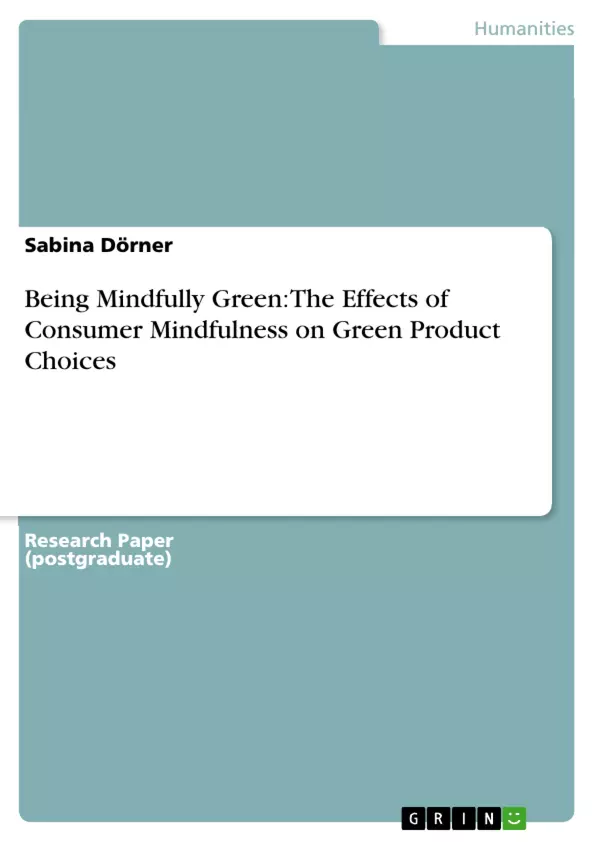Research indicates that mindfulness is a consumer characteristic that influences the choice between green and non-green products. Therefore, this research proposal examines the effects of consumer mindfulness on green product choices and the moderating role of cognitive load in this relationship. The study predicts that consumer mindfulness leads to the choice of greener products and that this effect is attenuated by cognitive load. A between-subject experimental study will be conducted with a sample of 128 students from Maastricht University. The research hypotheses will be tested using a binary logistic regression. I propose that mindfulness significantly predicts green product choices, suggesting that mindful consumers are more likely to choose green products than non-mindful consumers. Furthermore, cognitive load will moderate the effects of mindfulness on green product choices. When cognitive load is high, consumers are less likely to purchase green products when they are mindful than when cognitive load is low. From the research results, it can be inferred that encouraging consumers to be mindful is beneficial in promoting the purchase of sustainable products when cognitive load is kept low. In addition, the study identifies limitations and gives recommendations for future research.
Inhaltsverzeichnis (Table of Contents)
- Introduction
- Theory
- Methodology
- Results
- Discussion
- References
- Appendix A
- Appendix B
- Appendix C
- Appendix D
Zielsetzung und Themenschwerpunkte (Objectives and Key Themes)
This research paper examines the effects of consumer mindfulness on green product choices and the moderating role of cognitive load in this relationship. It aims to determine the extent to which consumer mindfulness influences green product choices and how cognitive load affects this relationship. The study utilizes a between-subject experimental design to test the hypotheses.
- The impact of consumer mindfulness on green product choices
- The moderating effect of cognitive load on the relationship between mindfulness and green product choices
- The influence of mindfulness on consumer decision-making processes
- The role of cognitive resources in promoting sustainable consumption
- The implications of mindful consumption for encouraging sustainable purchasing behavior
Zusammenfassung der Kapitel (Chapter Summaries)
The paper begins by introducing the growing concern of environmental impact due to increased consumption of goods and services. It highlights the need for promoting sustainable consumption patterns and focuses on the potential of mindful consumption to influence green product choices. The second chapter delves into the theoretical framework, defining mindfulness and its role in consumer behavior. It proposes two hypotheses: that consumer mindfulness leads to green product choices and that cognitive load moderates this relationship.
The methodology chapter outlines the experimental design, participant recruitment, and data collection methods. It details the manipulation of mindfulness and cognitive load, as well as the dependent variable – the choice between green and non-green products.
Schlüsselwörter (Keywords)
The study focuses on mindfulness, sustainable consumption, green products, cognitive load, and consumer decision-making. The research explores the relationship between mindfulness and green product choices, examining the moderating effect of cognitive load and its implications for promoting sustainable purchasing behavior.
Frequently Asked Questions
How does mindfulness affect green product choices?
Research suggests that mindful consumers are more likely to choose sustainable or green products compared to non-mindful consumers.
What is the role of cognitive load in this study?
Cognitive load acts as a moderator. When cognitive load is high, the positive effect of mindfulness on choosing green products is attenuated.
Who were the participants of the experimental study?
The study was conducted with a sample of 128 students from Maastricht University using a between-subject experimental design.
What is meant by "Mindful Consumption"?
Mindful consumption refers to a conscious awareness during the purchasing process, which often leads to more sustainable and environmentally friendly decisions.
What statistical method was used to test the hypotheses?
The research hypotheses were tested using a binary logistic regression analysis.
What are the practical implications of these findings?
To promote sustainable products, companies should encourage mindfulness in consumers while ensuring that the shopping environment keeps cognitive load low.
- Citation du texte
- Sabina Dörner (Auteur), 2021, Being Mindfully Green: The Effects of Consumer Mindfulness on Green Product Choices, Munich, GRIN Verlag, https://www.grin.com/document/1185078



